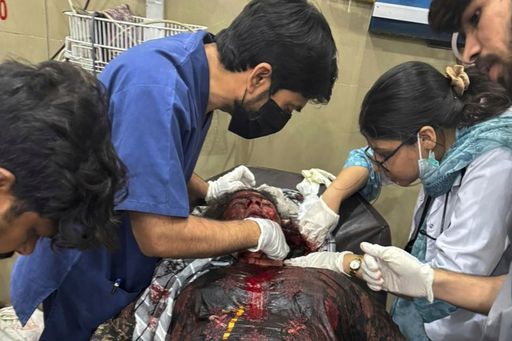The Pakistani Air Force has downed five Indian Air Force warplanes, Pakistani officials and local media reported, following Indian missile strikes on Pakistan that left eight people dead, 35 wounded and two missing.
Pakistan's Defence Minister Khawaja Asif on Wednesday said five Indian warplanes were downed.
"If these hostile acts are stopped... We will talk to India. We do not want this situation to escalate," Asif told Bloomberg. "But if there are hostile acts initiated from the Indian side, we have to respond."
Lieutenant General Ahmed Sharif Chaudhry, Pakistani military spokesperson, told Reuters that Pakistan shot down three Rafale planes, one Sukhoi SU-30 and one MIG-29 being flown by India.
Indian government sources confirmed to Reuters news agency that three fighter jets crashed in India-administered Kashmir.
An Indian official added a wounded pilot was taken to the hospital.
Earlier, Pakistani Minister of Information Attaullah Tarar told TRT World that one plane had been shot down over the Akhnoor sector in disputed Kashmir and another plane in the Indian city of Ambala, while a UAV drone was downed in the Jammu region of India-administered Kashmir.
A Pakistani military spokesperson said some other Indian defence installations have been "destroyed".
India has yet to respond to Pakistan's claims.
Residents in India-administered Kashmir reported loud blasts and shared videos appearing to show downed projectile parts.
Images showing Indian troops guarding a crashed fighter jet in Wuyan, Pulwama district, India-administered Kashmir, quickly spread on social media.

Pahalgam attack fallout
The escalation between the nuclear-armed neighbours comes in the wake of an April 22 attack in Pahalgam in India-administered Kashmir, in which 26 people were killed by suspected rebels.
India, without sharing any evidence, blamed Pakistan for the attack, claiming there were "cross-border" links.
Pakistan has strongly refuted the claims and requested an impartial inquiry, a move India has not endorsed.
Kashmir has been at the heart of the conflict between India and Pakistan, with both claiming it in full but ruling it in part since 1947.
Rebels in India-administered Kashmir have waged an insurgency since 1989. Most of the Muslim Kashmiris back the rebels' aim for independence or union with Pakistan.
India regularly blames its neighbour for backing the insurgency. Pakistan says it only offers political, moral, and diplomatic support for Kashmiris' right to self-determination as enshrined in UNSC resolutions.
India has stationed some 500,000 troops in the tiny Himalayan region.
Following the Pahalgam attack, both sides have implemented a series of retaliatory measures.
India suspended a crucial water-sharing Indus Water Treaty with Pakistan and closed the only functional land border crossing. It revoked visas issued to Pakistanis with effect from Sunday.
Pakistan retaliated by cancelling visas issued to Indians, closing its airspace to Indian airlines, halting trade with its neighbour and suspending the Simla Agreement with India.
The 1972 treaty was aimed at establishing peace and resolving disputes bilaterally, particularly focusing on the Kashmir dispute.



















